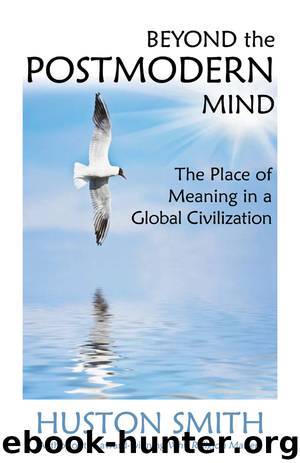Beyond the Postmodern Mind by Huston Smith

Author:Huston Smith
Format: epub, azw3
Publisher: Quest Books (Perseus)
Published: 2003-11-20T16:00:00+00:00
III. Theological Compromise?
That was a long section, so let me reiterate its point. Believing that the decline in our sense of transcendence is a loss, and that the chief reason for the decline has been the rise of a rival outlook presumed to be scientific, I think that it is important to show that that supposition is mistaken. Lacking space to show point by point where the error enters, I am going (in this essay) after the notion of a scientific worldview itself, and have presented three lines of argument that converge in the conclusion that there can be no such thing. When we find someone writing that “science is the measure of all things, of what is that it is, and of what is not that it is not,”13 we know automatically that scientism, not science, is speaking.
But now comes the touchy part. Of the five postures Richard Niebuhr showed the Church to have assumed toward culture in the course of its history—against it, with it, above it, paradoxical toward it, and with intent to transform it14—we are clearly in a “with culture” phase; Vatican II formalized this for Roman Catholicism and Bultmann’s victory over Barth is a weather vane for Protestantism. But if our culture is riddled with scientism—the problem being, as Victor Frankl puts it, not that then scientists are specializing, but that the specialists are generalizing—in conforming to culture, the Church runs the danger of scientistic rub-off.
There is no way to insure against this danger, but the guidelines (at least) seem clear. It goes without saying that theologians should respect the proven findings of science and can continue to affirm as they have (in the past three decades especially) that:
Scientists are no less blessed with human virtues than the rest of us. Their work does not pull against their idealism, good will, and natural piety (Harold Schilling, William Pollard, Ian Barbour).
Their intellectual virtues are not mechanical—limited to logic and linear thinking. Great science requires as much imagination, inspiration, and “art” as any other creative endeavor (Abraham Maslow, Michael Polanyi).
Equally, as institution, science is as fallible as other social efforts. False starts, blind alleys, in-house vendettas and outright dishonesty plague it as much as they do the Church (Thomas Kuhn, James Watson’s The Double Helix, and again Polanyi).
These commonalities, though, should not be allowed to obscure (first) the distinctiveness of scientific knowing, and (second) the limited character of the conclusions that can issue from that distinctiveness.
The first of these two dividing, rather than reconciling, tasks is currently complicated by a move within the philosophy of science itself that slurs the difference between scientific and other ways of knowing. Because at advanced levels the components of science are not tested against experience one by one but only as a whole via theories, it is now generally accepted that scientific facts are theory laden. In verifying a theory, we move in a circle from hypothesis to data, data to hypothesis, without ever encountering any bare facts which could call the whole theory into question.
Download
This site does not store any files on its server. We only index and link to content provided by other sites. Please contact the content providers to delete copyright contents if any and email us, we'll remove relevant links or contents immediately.
The Lost Art of Listening by Michael P. Nichols(7475)
Why I Am Not A Calvinist by Dr. Peter S. Ruckman(4133)
The Rosicrucians by Christopher McIntosh(3501)
Wicca: a guide for the solitary practitioner by Scott Cunningham(3156)
Signature in the Cell: DNA and the Evidence for Intelligent Design by Stephen C. Meyer(3114)
Real Sex by Lauren F. Winner(3000)
The Holy Spirit by Billy Graham(2931)
To Light a Sacred Flame by Silver RavenWolf(2800)
The End of Faith by Sam Harris(2722)
The Gnostic Gospels by Pagels Elaine(2515)
Waking Up by Sam Harris(2441)
Nine Parts of Desire by Geraldine Brooks(2354)
Jesus by Paul Johnson(2347)
Devil, The by Almond Philip C(2318)
The God delusion by Richard Dawkins(2291)
Heavens on Earth by Michael Shermer(2266)
Kundalini by Gopi Krishna(2165)
Chosen by God by R. C. Sproul(2147)
The Nature of Consciousness by Rupert Spira(2082)
